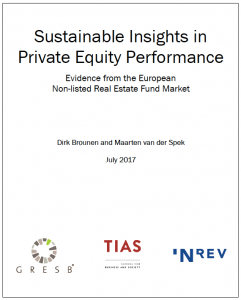 A 10 point higher GRESB total score corresponds with a 34 basis points higher annual fund return.
A 10 point higher GRESB total score corresponds with a 34 basis points higher annual fund return.
That’s the key takeaway from the research paper by Dirk Brounen (Tilburg University) and Maarten van der Spek, July 2017, published by TIAS.
The research analyzed the performance of almost 340 European non-listed real estate funds representing well over 200 billion Euros of gross asset value. It examined the relationship between GRESB scores – which provide an overall measure of environmental, social and governance (ESG) performance – and INREV returns in order to shed light on non-listed fund performance.
The research found that:
- Early GRESB adopters tend to be larger funds with above average returns,
- GRESB scores improve the understanding of non-listed fund performance,
- The link between GRESB scores and higher fund returns strengthens when a time lag is added, and
- In the absence of fund information, GRESB scores help as an alternative for good governance.
This research matters because it adds to the long line of evidence that strong ESG practices in the real estate sector can help drive better performance and shareholder returns over time. This link is driving real estate investors to increasingly consider ESG as a way to identify portfolio risk and opportunity.
It also underlines the importance for real estate companies and funds to report more ESG data to the market and engage with investors on their performance.
View the full report here.